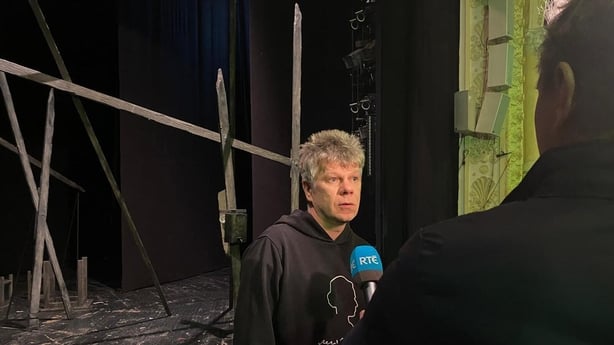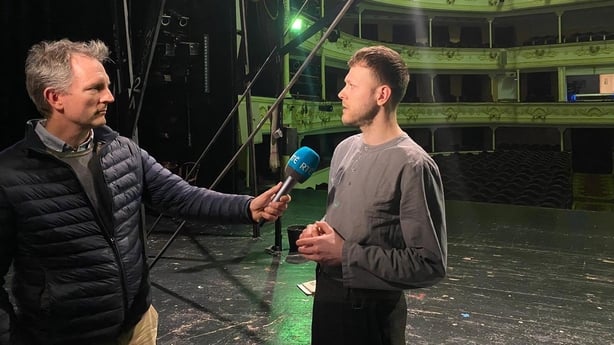From Ballybeg to Bakhmut: why Ukrainians embrace Brian Friel's Translations
"[Irish] is a rich language ... full of the mythologies of fantasy and hope and self-deception - a syntax opulent with tomorrows," muses Hugh, the hedge school teacher in Ballybeg, on a stage littered with few props except hay bales and some kitchen utensils.
He is reflecting on his conversation with Lieutenant Yolland, the British army engineer sent to the fictional Irish-speaking village in Co Donegal with the Ordnance Survey.
"It is our response to mud cabins and a diet of potatoes; our only method of replying to ... inevitabilities."
Brian Friel’s Translations is about language and the inability to communicate, and also about cultural imperialism as the Ordnance Survey sets about anglicising Gaelic place names.
But Hugh is played by Oleksandr Kobzar, and we are not in the Abbey Theatre, Dublin but in Ukraine’s National Academy Drama Theatre in wartime Kyiv.
I caught up with the drama troupe just before the 5pm performance, as air-raid sirens sounded throughout the capital.
Director Kyrylo Kashlikov selected Translations to be performed in 2020, but the production was held up by the Covid-19 pandemic.
He had already directed Martin McDonagh’s The Cripple of Inishmaan but was drawn back to the Irish dramatical canon by the contemporary crisis in Ukraine after Russia had invaded Crimea in 2014.

"During this past eight years, we have been thinking about the loss of the identity of Ukraine," says Anastasye Pavlenko, assistant producer.
"So we decided to choose this play, because we feel a connection between our situation and the situation in Ireland many years ago."
The director, Kyrylo Kashlikov, says: "When you start forbidding people from speaking the language they were born with, that starts to cause very big problems.
"It’s not even about a specific region, this place or that place. The problem is that it is not even possible to formulate a ban on speaking in the language a person wants to speak."

The parallels between Ireland of the pre-famine era and wartime Ukraine should not be overstated, but there are some striking echoes.
Across the occupied territories there is an enforced Russification reaching into schools and homes.
Ukrainian children in the occupied east and south of Ukraine are forbidden from learning their native language, being forced instead to speak Russian.
In November I met a teacher in Kyiv who was giving online Ukrainian classes to children who were in the Russian-occupied part of the Kherson region.
She said that children would regularly have to wipe their phones of any trace of the Ukrainian classes, to the extent that she would often have to send homework three or four times.
This struck me as a hedge school for the 21st century.

Translations premiered in October, eight months after Russian tanks tried to capture the city, and although it has only been staged once or twice a week each performance has been sold out.
"The audience totally appreciates it, but they feel a little bit sad after each performance, because it really touches us, because the play is about us," says assistant producer Anastasye Pavlenko.
Olga Uzun, who plays Máire, says: "The subject matter has been around for a long time, why have soldiers come to our town? Of course it affects you, because my family found themselves in such a situation."
The national theatre has a troupe of some 100 actors.
Some have been drafted into frontline fighting, but those who have remained say that keeping Ukrainian culture alive and present is vital, for audiences and actors alike.
Andriy Kovalenko, who plays Manus, says: "Sometimes I have to force myself to disconnect from what is going on and go somewhere, to the theater, to a movie, an exhibition and just disconnect from reality."
The difference between the Irish locals and British soldiers in Ballybeg in the 1830s is that they cannot communicate with each other, whereas Ukrainians and Russians can very well, due to the close linguistic bonds.
The reality is that that bond has been shattered by the invasion.

"We can't communicate with [Vladimir] Putin at the moment," says Pavlenko.
"The problem is that Irish people and English people didn't understand each other but we're Ukrainian and Russian. We understand the Russian language and we can understand each other. But now we just can't speak to each other because they’re in a different universe."
In fact, until a year ago the theatre was known as the Russian Drama Theatre.
The theatre company has since changed its name and banned the use of Russian and Russian plays.
"The 24th of February [2022] was like the starting point, to change everything in our lives," says Pavlenko.
The theatre’s funding has been cut as the government struggles to maintain services in the face of the invasion.
But the ticket prices have remained the same, and with each performance the audience is willing to pay for those tickets, often braving air-raid sirens and suspended public transport, to make it to the theatre, and to the Donegal town land of the 1830s.
RTE Sunday, 26 Feb 2023 19:30
Посилання: